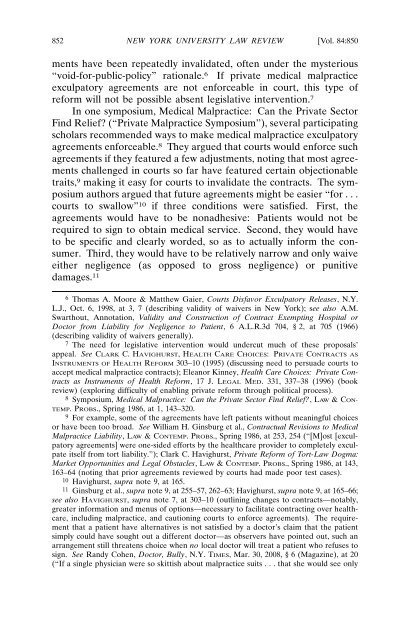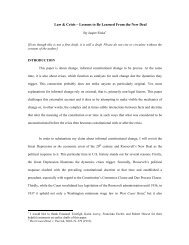In Search of an Enforceable Medical Malpractice Exculpatory
In Search of an Enforceable Medical Malpractice Exculpatory
In Search of an Enforceable Medical Malpractice Exculpatory
You also want an ePaper? Increase the reach of your titles
YUMPU automatically turns print PDFs into web optimized ePapers that Google loves.
852 NEW YORK UNIVERSITY LAW REVIEW [Vol. 84:850<br />
ments have been repeatedly invalidated, <strong>of</strong>ten under the mysterious<br />
“void-for-public-policy” rationale. 6 If private medical malpractice<br />
exculpatory agreements are not enforceable in court, this type <strong>of</strong><br />
reform will not be possible absent legislative intervention. 7<br />
<strong>In</strong> one symposium, <strong>Medical</strong> <strong>Malpractice</strong>: C<strong>an</strong> the Private Sector<br />
Find Relief? (“Private <strong>Malpractice</strong> Symposium”), several participating<br />
scholars recommended ways to make medical malpractice exculpatory<br />
agreements enforceable. 8 They argued that courts would enforce such<br />
agreements if they featured a few adjustments, noting that most agreements<br />
challenged in courts so far have featured certain objectionable<br />
traits, 9 making it easy for courts to invalidate the contracts. The symposium<br />
authors argued that future agreements might be easier “for . . .<br />
courts to swallow” 10 if three conditions were satisfied. First, the<br />
agreements would have to be nonadhesive: Patients would not be<br />
required to sign to obtain medical service. Second, they would have<br />
to be specific <strong>an</strong>d clearly worded, so as to actually inform the consumer.<br />
Third, they would have to be relatively narrow <strong>an</strong>d only waive<br />
either negligence (as opposed to gross negligence) or punitive<br />
damages. 11<br />
6 Thomas A. Moore & Matthew Gaier, Courts Disfavor <strong>Exculpatory</strong> Releases, N.Y.<br />
L.J., Oct. 6, 1998, at 3, 7 (describing validity <strong>of</strong> waivers in New York); see also A.M.<br />
Swarthout, Annotation, Validity <strong>an</strong>d Construction <strong>of</strong> Contract Exempting Hospital or<br />
Doctor from Liability for Negligence to Patient, 6 A.L.R.3d 704, § 2, at 705 (1966)<br />
(describing validity <strong>of</strong> waivers generally).<br />
7 The need for legislative intervention would undercut much <strong>of</strong> these proposals’<br />
appeal. See CLARK C. HAVIGHURST, HEALTH CARE CHOICES: PRIVATE CONTRACTS AS<br />
INSTRUMENTS OF HEALTH REFORM 303–10 (1995) (discussing need to persuade courts to<br />
accept medical malpractice contracts); Ele<strong>an</strong>or Kinney, Health Care Choices: Private Contracts<br />
as <strong>In</strong>struments <strong>of</strong> Health Reform, 17 J. LEGAL MED. 331, 337–38 (1996) (book<br />
review) (exploring difficulty <strong>of</strong> enabling private reform through political process).<br />
8 Symposium, <strong>Medical</strong> <strong>Malpractice</strong>: C<strong>an</strong> the Private Sector Find Relief?, LAW & CON-<br />
TEMP. PROBS., Spring 1986, at 1, 143–320.<br />
9 For example, some <strong>of</strong> the agreements have left patients without me<strong>an</strong>ingful choices<br />
or have been too broad. See William H. Ginsburg et al., Contractual Revisions to <strong>Medical</strong><br />
<strong>Malpractice</strong> Liability, LAW & CONTEMP. PROBS., Spring 1986, at 253, 254 (“[M]ost [exculpatory<br />
agreements] were one-sided efforts by the healthcare provider to completely exculpate<br />
itself from tort liability.”); Clark C. Havighurst, Private Reform <strong>of</strong> Tort-Law Dogma:<br />
Market Opportunities <strong>an</strong>d Legal Obstacles, LAW & CONTEMP. PROBS., Spring 1986, at 143,<br />
163–64 (noting that prior agreements reviewed by courts had made poor test cases).<br />
10 Havighurst, supra note 9, at 165.<br />
11 Ginsburg et al., supra note 9, at 255–57, 262–63; Havighurst, supra note 9, at 165–66;<br />
see also HAVIGHURST, supra note 7, at 303–10 (outlining ch<strong>an</strong>ges to contracts—notably,<br />
greater information <strong>an</strong>d menus <strong>of</strong> options—necessary to facilitate contracting over healthcare,<br />
including malpractice, <strong>an</strong>d cautioning courts to enforce agreements). The requirement<br />
that a patient have alternatives is not satisfied by a doctor’s claim that the patient<br />
simply could have sought out a different doctor—as observers have pointed out, such <strong>an</strong><br />
arr<strong>an</strong>gement still threatens choice when no local doctor will treat a patient who refuses to<br />
sign. See R<strong>an</strong>dy Cohen, Doctor, Bully, N.Y. TIMES, Mar. 30, 2008, § 6 (Magazine), at 20<br />
(“If a single physici<strong>an</strong> were so skittish about malpractice suits . . . that she would see only
















